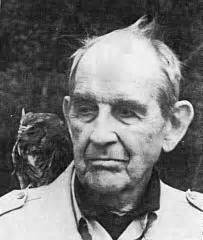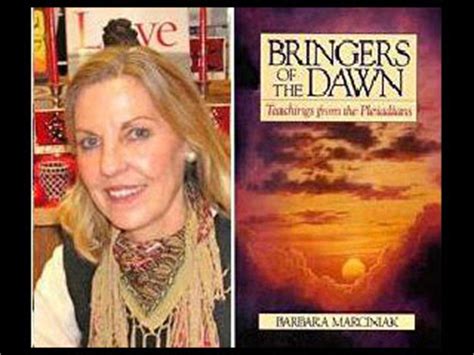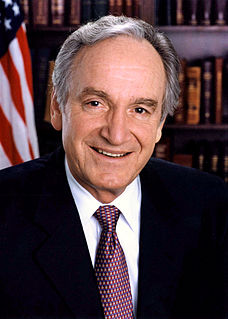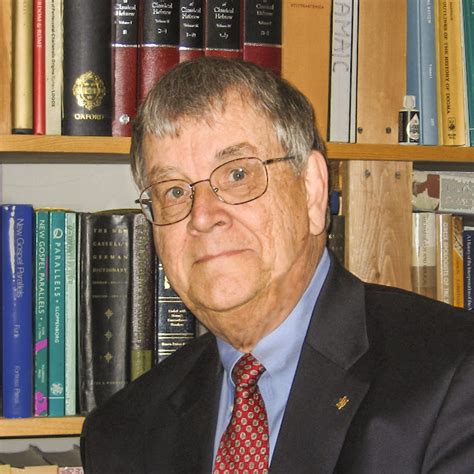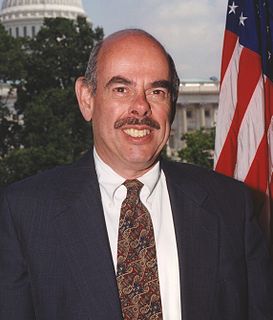Top 1033 Biological Quotes & Sayings - Page 17
Explore popular Biological quotes.
Last updated on December 20, 2024.
We can speak of politics, ethics, and in this way, speak about the world. But at the same time, it's always in a way that is totally nebulous and abstracted, this way of thinking about reality. And that's why I write the way I do - it's an almost immortal way to show dependence on the biological, the political, the moral parts of us. I say immortal because we now have to find new formats, new eloquences, and resolve within ourselves this "constructed" life, a life that is incomplete, imperfect.
Every ecosystem, even a small one, is sustainable because it has certain ensembles and conditions and influences that are unique to it. And the biological ensembles are almost certainly, even the most modest ones, in the thousands of species. We don't know what's involved in the models - not even the beginnings. And yet we're trying to make a sustainable world, which has to include the natural world. The human species is triumphant, but it's got to get a grip. It's got to come to understand what's happened, why we're this way and what we're doing.
Men in all societies possess the biological equipment to remove their hats or shoes, but it is the birth within a particular culture that decides that a Jew will keep his hat and shoes on in his place of worship, a Mohammedan will take off his shoes, and a Christian will keep his shoes on but remove his hat.
The whole point of marriage is to stop you getting anywhere near real life. You think it's a great struggle with the mystery of being. It's more like being smothered in warm cocoa. There's sex, but it's not what you think. Marvellous, for the first fortnight. Then every Wednesday. If there isn't a good late-night concert on the Third. Meanwhile you become a biological functionary. An agent of the great female womb, spawning away, dumping its goods in your lap for succour. Daddy, daddy, we're here, and we're expensive.
Few scientists acquainted with the chemistry of biological systems at the molecular level can avoid being inspired. Evolution has produced chemical compounds exquisitely organized to accomplish the most complicated and delicate of tasks. Many organic chemists viewing crystal structures of enzyme systems or nucleic acids and knowing the marvels of specificity of the immune systems must dream of designing and synthesizing simpler organic compounds that imitate working features of these naturally occurring compounds.
The business of proving evolution has reached a stage when it is futile for biologists to work merely to discover more and more evidence of evolution. Those who choose to believe that God created every biological species separately in the state we observe them, but made them in a way calculated to lead us to the conclusion that they are the products of an evolutionary development are obviously not open to argument. All that can be said is that their belief is an implicit blasphemy, for it imputes to God an appalling deviousness.
Human use of fossil fuels is altering the chemistry of the atmosphere; oceans are polluted and depleted of fish; 80 per cent of Earth's forests are heavily impacted or gone yet their destruction continues. An estimated 50,000 species are driven to extinction each year. We dump millions of tonnes of chemicals, most untested for their biological effects, and many highly toxic, into air, water and soil. We have created an ecological holocaust. Our very health and survival are at stake, yet we act as if we have plenty of time to respond.
Although a biologist, I must confess I do not understand how life came about... I consider that life only starts at the level of a functional cell. The most primitive cells may require at least several hundred different specific biological macro-molecules. How such already quite complex structures may have come together, remains a mystery to me. The possibility of the existence of a Creator, of God, represents to me a satisfactory solution to this problem.
Pessimists are just as illogical as optimists; insomuch as both envisage the aims of mankind as unified, and as having a direct relationship (either of frustration or of fulfilment) to the inevitable flow of terrestrial motivation and events. That is - both schools retain in a vestigial way the primitive concept of a conscious teleology - of a cosmos which gives a damn one way or the other about the especial wants and ultimate welfare of mosquitos, rats, lice, dogs, men, horses, pterodactyls, trees, fungi, dodos, or other forms of biological energy.
I want good science, and I want it to be realistically marketed. I wouldn't like only two countries on the planet that allow pharmaceutical companies to market directly to people, New Zealand and the United States. It ought to be better regulated. And when it's presented to people, it ought to be presented in a way that's realistic. For example, often people will prescribe antidepressant medications, and we'll say, you have a brain disease; you'll have to be on these medications permanently. There is no biological marker for depression. It's not true that we know that it's a brain disease.
We now have a better biological and psychological understanding of our moral thinking. The idea that we should do what maximizes happiness sounds very reasonable, but it often conflicts with our gut reactions. Philosophers have spent the last century or so finding examples where our intuition runs counter to this idea and have taken these as signals that something is wrong with this philosophy. But when you look at the psychology behind those examples, they become less compelling. An alternative is that our gut reactions are not always reliable.
It's like in biological evolution: The population will evolve, even though individuals can't. The same thing happens in the corporate world: The population of business units within corporations evolves, even though individual business units can't. That's because the capabilities of business units reside in their processes and their values, and by their very nature, processes and values are inflexible and meant not to change.
The underlying idea is that you can prevent disease by balancing your body's pH... None of these claims are true. Furthermore, your body needs absolutely no help in adjusting its pH. Normally, the pH of blood and most body fluids is near seven, which is close to neutral. This is under very tight biological control because all of the chemical reactions that maintain life depend on it. Unless you have serious respiratory or kidney problems, body pH will remain in balance no matter what you eat or drink.
Internationalism is a community theory of society which is founded on economic, spiritual, and biological facts. It maintains that respect for a healthy development of human society and of world civilization requires that mankind be organized internationally. Nationalities should form the constitutive links in a great world alliance, and must be guaranteed an independent life in the realm of the spiritual and for locally delimited tasks, while economic and political objectives must be guided internationally in a spirit of peaceful cooperation for the promotion of mankind's common interests.
The cry for freedom is a sign of suppression. It will not cease to ring as long as man feels himself captive. As diverse as the cries for freedom may be, basically they all express one and the same thing: The intolerability of the rigidity of the organism and of the machine-like institutions which create a sharp conflict with the natural feelings for life. Not until there is a social order in which all cries for freedom subside will man have overcome his biological and social crippling, will he have attained genuine freedom.
The great paradox of determinism and free will, which has held the attention of the wisest of philosophers and psychologists for generations, can be phrased in more biological terms as follows: If our genes are inherited, and our environment is a train of physical events set in motion before we were born, how can there be a truly independent agent within the brain? The agent itself is created by the interaction of the genes and the environment. It would appear that our freedom is only a self delusion.
If you think you have no power over what happens in the outside world, this is a belief and an agreement you have made between yourself and the field of existence. Your cells hear this command about your place in reality and do everything possible to make certain, in whatever situation you meet, that you have no power over events. Your beliefs establish the instructions for how you want to operate your biological being, and in these times of tremendous acceleration, humankind is faced with the responsibility of learning how to manage the energy of thought
The thing that distinguishes social systems from physical or even biological systems is their incomparable (and embarrassing) richness in special cases. Generalizations in the social sciences are mere pathways which lead through a riotous forest of individual trees, each a species unto itself. The social scientist who loses this sense of the essential individuality and uniqueness of each case is all too likely to make a solemn scientific ass of himself, especially if he thinks that his faceless generalizations are the equivalents of the rich vareity of the world.
Someone who is experiencing gender dysphoria would be someone who feels that his biological sex doesn't match up with the gender that he feels. So, I might feel like I am a woman trapped in a male body, and you can imagine how horrible that would be to have that kind of experience or to think that you're a man trapped in a woman's body. It must be just a terribly difficult experience for those who experience gender dysphoria. But this is not anything to do with homosexual attraction or activity. It's a matter of one's self-perceived identity.
Scientists themselves readily admit that they do not fully understand the consequences of our many-faceted assault upon the interwoven fabric of atmosphere, water, land and life in all its biological diversity. But things could also turn out to be worse than the current scientific best guess. In military affairs, policy has long been based on the dictum that we should be prepared for the worst case. Why should it be so different when the security is that of the planet and our long-term future?
As a professor in two fields, neurology and psychiatry, I am fully aware of the extent to which man is subject to biological, psychological and sociological conditions. But in addition to being a professor in two fields I am a survivor of four camps - concentration camps, that is - and as such I also bear witness to the unexpected extent to which man is capable of defying and braving even the worst conditions conceivable.
There are some things in the world we can't change- gravity, entropy, the speed of light, and our biological nature that requires clean air, clean water, clean soil, clean energy and biodiversity for our health and well-being. Protecting the biosphere should be our highest priority or else we sicken and die. Other things, like capitalism, free enterprise, the economy, currency, the market, are not forces of nature, we invented them. They are not immutable and we can change them. It makes no sense to elevate economics above the biosphere.
America has shown we are serious about removing the threat of weapons of mass destruction... We now know that Saddam Hussein had the capacity to produce weapons of mass destruction.... We know he had the necessary infrastructure because we found the labs and the dual-use facilities that could be used for these chemical and biological agents. We know that he was developing the delivery systems - ballistic missiles - that had been prohibited by the United Nations.
The social dynamics of human history, even more than that of biological evolution, illustrate the fundamental principle of ecological evolution - that everything depends on everything else. The nine elements that we have described in societal evolution of the three families of phenotypes - the phyla of things, organizations and people, the genetic bases in knowledge operating through energy and materials to produce phenotypes, and the three bonding relations of threat, integration and exchange - all interact on each other.
A farm includes the passion of the farmer's heart, the interest of the farm's customers, the biological activity in the soil, the pleasantness of the air about the farm -- it's everything touching, emanating from, and supplying that piece of landscape. A farm is virtually a living organism. The tragedy of our time is that cultural philosophies and market realities are squeezing life's vitality out of most farms. And that is why the average farmer is now 60 years old. Serfdom just doesn't attract the best and brightest.
Much of the ill-tempered railing against women that has characterized the popular writing of the last two years is a half-heartedattempt to find a way back to a more balanced relationship between our biological selves and the world we have built. So women are scolded both for being mothers and for not being mothers, for wanting to eat their cake and have it too, and for not wanting to eat their cake and have it too.
Whereas Iraq has consistently breached its cease-fire agreement between Iraq and the United States, entered into on March 3, 1991, by failing to dismantle its weapons of mass destruction program, and refusing to permit monitoring and verification by United Nations inspections; Whereas Iraq has developed weapons of mass destruction, including chemical and biological capabilities, and has made positive progress toward developing nuclear weapons capabilities
As for man, there is little reason to think that he can in the long run escape the fate of other creatures, and if there is a biological law of flux and reflux, his situation is now a highly perilous one. During ten thousand years his numbers have been on the upgrade in spite of wars, pestilences, and famines. This increase in population has become more and more rapid. Biologically, man has for too long a time been rolling an uninterrupted run of sevens.
Family seems so rich and complicated to me. There's meant to be this unfailing biological loyalty and yet at the same time it's this theatre for various kinds of cruelty. I know it doesn't always work out that way, but the worst possible behaviour is sort of allowed for. It looks to me like an endlessly rich container for really terrible drama, but also pretty grand love. It accommodates such a variety of feeling in such a natural way, and it feels so relatable, and yet it's such a funny construct, socially, the family.
A boyfriend or a girlfriend may be fun, but cannot become a door to the deepest that is hidden in each and everyone. With a girlfriend you can be sexually related, but love cannot grow. Love needs deep roots. Sexuality is possible on the surface, but sexuality is just animal, biological. It can be beautiful if it is part of a deeper love, but if it is not part of a deeper love it is the most ugly thing possible; the ugliest, because then there is no communion - you simply touch each other and separate. Only bodies meet, but not you - not I, not thou. This has happened in all relationships.
The Christian view that all intercourse outside marriage is immoral was, as we see in the above passages from St. Paul, based upon the view that all sexual intercourse, even within marriage, is regrettable. A view of this sort, which goes against biological facts, can only be regarded by sane people as a morbid aberration. The fact that it is embedded in Christian ethics has made Christianity throughout its whole history a force tending towards mental disorders and unwholesome views of life.
Every farmer must go to the seed industry every year to buy their seed and pay an 80 percent royalty to a corporation. Over-the-fence exchanges have started to be treated as crimes. Or, if you need a biological pest control, you can no longer use the need seed in your back yard. Instead you have to depend on the Grace Corporation or some other entity. That kind of dependency basically leads to increased poverty and increased ecological destruction.
We still know so little about how the brain interacts with the body chemistry or, for that matter, whether we should be talking about the brain or the mind, that it would be perilous to hazard any guess about the way Abraham Lincoln's biological health may or may not have affected him. Of course, we don't have Lincoln on hand to ask him directly; but even if we did, we still might not be able to make sense of how all the parts worked together.
In the 21st Century, the community of nations may see more and more of this very kind of threat that Iraq poses now - a rogue state with biological and chemical weapons. If we fail to respond, Saddam and all those who follow will believe that they can threaten the security of a vital region with impunity. But if we act now as one, we will send a clear message to would-be tyrants and terrorists that we will do what it takes to protect our security and our freedom in this new era.
There's no question that Saddam Hussein is a threat Yes, he has chemical and biological weapons. He's had those for a long time. But the United States right now is on a very much different defensive posture than we were before September 11th of 2001 He is, as far as we know, actively pursuing nuclear capabilities, though he doesn't have nuclear warheads yet. If he were to acquire nuclear weapons, I think our friends in the region would face greatly increased risks as would we.
I think like almost everything in evolution, the old forms persist. New forms come along - not always, of course; there are species and whole lineages that go extinct - but basically novels and plays, and so on, will continue to exist. Jokes, as the lowest-cost form of narrative, will certainly continue to exist. They're a bit like microbes in the biological world. They're low-cost and they're everywhere. They're the most successful form of life, even though they're not the ones we think about most.
One dictionary that I consulted remarks that "natural history" now commonly means the study of animals and plants "in a popular and superficial way," meaning popular and superficial to be equally damning adjectives. This is related to the current tendency in the biological sciences to label every subdivision of science with a name derived from the Greek. "Ecology" is erudite and profound; while "natural history" is popular and superficial. Though, as far as I can see, both labels apply to just about the same package of goods.
A spiritual partnership is a partnership between equals for the purpose of spiritual growth. Nothing like this archetype has existed before because nothing like this was required before in the human experience. And spiritual partnerships can be created in a biological family, they can be created among friends, they can be created in the workplace, they can be created anywhere that two or more individuals are committed to their own spiritual evolution and are striving to relate to each other as equals.
The gigantic catastrophes that threaten us today are not elemental happenings of a physical or biological order, but psychic events. To a quite terrifying degree we are threatened by wars and revolutions which are nothing other than psychic epidemics. At any moment several million human beings may be smitten with a new madness, and then we shall have another world war or devastating revolution. Instead of being at the mercy of wild beasts, earthquakes, landslides, and inundations, modern man is battered by the elemental forces of his own psyche.
I think the most important work that is going on has to do with the search for very general and abstract features of what is sometimes called universal grammar: general properties of language that reflect a kind of biological necessity rather than logical necessity; that is, properties of language that are not logically necessary for such a system but which are essential invariant properties of human language and are known without learning. We know these properties but we don't learn them. We simply use our knowledge of these properties as the basis for learning.
Here's the thing. I hate kids. Always have. I mean, I know the job of the race, biologically speaking, is to achieve immortality through reproduction, but the idea of getting impregnated and blowing up like a balloon as I serve as a carrier and service unit for this other person who will eventually burst out of me in the most terrifying way imaginable, then carry on using me one way or another for the rest of my life, is right up there with throwing myself off the top of a twenty-story building. If I have a biological clock, it is digital and does not tick.
The most devastating thing though that biology did to Christianity was the discovery of biological evolution. Now that we know that Adam and Eve never were real people the central myth of Christianity is destroyed. If there never was an Adam and Eve there never was an original sin. If there never was an original sin there is no need of salvation. If there is no need of salvation there is no need of a Savior. And I submit that puts Jesus, historical or otherwise, into the ranks of the unemployed. I think that evolution is absolutely the death knell of Christianity.
Masturbation is not physically necessary. There is already a way by which the male system relieves excessive spermatic fluid quite regularly through the nocturnal emission or wet dream. Monthly menstrual flow expels the female's egg and cleanses the womb. For both sexes, physical or emotional tensions can be released by vigorous activity. Thus, in a biological sense, masturbation for either gender is not necessary. In a gospel sense, it is a sin: Masturbation, a rather common indiscretion, is not approved of the Lord...regardless of what may have been said by others whose 'norms' are lower.
I think, in fact, the situation with respect to al Qaeda, to say that, you know, that was a big attack we had on 9/11, but it's not likely again, I just think that's dead wrong. I think the biggest strategic threat the United States faces today is the possibility of another 9/11 with a nuclear weapon or a biological agent of some kind. And I think al Qaeda is out there even as we meet, trying to figure out how to do that.
Nature has come to a point where now, unless you take individual responsibility, you cannot grow. More than this nature cannot do. It has done enough. It has given you life, it has given you opportunity; now how to use it, it has left up to you. Meditation is your freedom, not a biological necessity. You can learn in a certain period of time every day to strengthen meditation, to make it stronger - but carry the flavor of it the whole day.
He has systematically violated, over the course of the past 11 years, every significant UN resolution that has demanded that he disarm and destroy his chemical and biological weapons, and any nuclear capacity. This he has refused to do. He lies and cheats; he snubs the mandate and authority of international weapons inspectors; and he games the system to keep buying time against enforcement of the just and legitimate demands of the United Nations, the Security Council, the United States and our allies. Those are simply the facts.
We belong to that order of mammals, the primates, distinguished by its propensity for repeated single litters, intense parental care, long life-spans, late sexual maturity, and a complex and extensive social existence... Our protracted biological and psychological helplessness, which extends well into the third year of life, intensifies the bond between infant and parents, making possible a sense of generational continuity. In contrast to other primates these bonds are not obliterated after sexual maturity.
There is no permanent status quo in nature; all is the process of adjustment and readjustment, or else eventual failure. But man is the first being yet evolved on earth which has the power to note this changefulness, and, if he will, to turn it to his own advantage, to work out genetic methods, eugenic ideas, yes, to invent new characteristics, organs, and biological systems that will work out to further the interests, the happiness, the glory of the God-like being whose meager foreshadowings we the present ailing creatures are.
In the field of consciousness research-and also in physics and astronomy-we are breaking past the cause-and-effect, mechanistic way of interpreting things. In the biological sciences, there is a vitalism coming in that goes much further toward positing a common universal consciousness of which our brain is simply an organ. Consciousness does not come from the brain. The brain is an organ of consciousness. It focuses consciousness and pulls it in and directs it through a time and space field. But the antecedent of that is the universal consciousness of which we are all just a part.
But nature - that is, biological evolution - has not fitted man to any specific environment. On the contrary, ... he has a rather crude survival kit; and yet -this is the paradox of the human condition - one that fits him to all environments. Among the multitude of animals which scamper, fly, burrow and swim around us, man is the only one who is not locked into his environment. His imagination, his reason, his emotional subtlety and toughness, make it possible for him not to accept the environment but to change it.
During the time that [Karl] Landsteiner gave me an education in the field of imununology, I discovered that he and I were thinking about the serologic problem in very different ways. He would ask, What do these experiments force us to believe about the nature of the world? I would ask, What is the most. simple and general picture of the world that we can formulate that is not ruled by these experiments? I realized that medical and biological investigators were not attacking their problems the same way that theoretical physicists do, the way I had been in the habit of doing.
My view is that consciousness, the seat of "personalness," is the ultimate reality, and is also scientifically impenetrable. In other words, there is no scientific test one can postulate that would definitively prove its existence in another entity. We assume that other biological human persons, at least those who are at least acting conscious, are indeed conscious. But this too is an assumption, and this shared human consensus breaks down when we go beyond human experience (e.g., the debate on animal consciousness, and by extension animal rights).
For the fundamental fact of human psychology is that society, instead of remaining almost entirely inside the individual organism as in the case of animals prompted by their instincts, becomes crystallized almost entirely outside the individuals. In other words, social rules, as Durkheim has so powerfully shown, whether they be linguistic, moral, religious, or legal, etc., cannot be constituted, transmitted or preserved by means of an internal biological heredity, but only through the external pressure exercised by individuals upon each other.
Biology is a science of three dimensions. The first is the study of each species across all levels of biological organization, molecule to cell to organism to population to ecosystem. The second dimension is the diversity of all species in the biosphere. The third dimension is the history of each species in turn, comprising both its genetic evolution and the environmental change that drove the evolution. Biology, by growing in all three dimensions, is progressing toward unification and will continue to do so.
Living as if the world out there were somehow separate from us opens the door to the belief system of judgement and the chemical expressions of that judgment in our bodies. Thus we tend to see our world in terms of good germs and bad germs, and use words such as toxins and waste to describe the by-products of the very functions that give us life. It is in such a world that our bodies may become a combat zone for forces at odds with one another, creating the biological battlegrounds that play out
Only within the 20th Century has biological thought been focused on ecology, or the relation of the living creature to its environment. Awareness of ecological relationships is - or should be - the basis of modern conservation programs, for it is useless to attempt to preserve a living species unless the kind of land or water it requires is also preserved. So delicately interwoven are the relationships that when we disturb one thread of the community fabric we alter it all - perhaps almost imperceptibly, perhaps so drastically that destruction follows.
To have security against atomic bombs and against the other biological weapons, we have to prevent war, for if we cannot prevent war every nation will use every means that is at their disposal; and in spite of all promises they make, they will do it. At the same time, so long as war is not prevented, all the governments of the nations have to prepare for war, and if you have to prepare for war, then you are in a state where you cannot abolish war.
A century ago mainstream science was still quite happy to countenance vital and mental powers which had a 'downwards' causal influence on the physical realm in a straightforwardly interactionist way. It was only in the middle of the last century that science finally concluded that there are no such non-physical forces. At which point a whole pile of smart philosophers (Feigl, Smart, Putnam, Davidson, Lewis) quickly pointed out that mental, biological and social phenomena must themselves be physical, in order to produce the physical effects that they do.
An atheist before Darwin could have said, following Hume: I have no explanation for complex biological design. All I know is that God isn't a good explanation, so we must wait and hope that somebody comes up with a better one. I can't help feeling that such a position, though logically sound, would have left one feeling pretty unsatisfied, and that although atheism might have been logically tenable before Darwin, Darwin made it possible to be an intellectually fulfilled atheist.
What we said publicly is that we know that Saddam Hussein has chemical weapons, he's used them; we know about his biological weapons programs; and in the nuclear equation, left to his own devices, with no fissile material, by the end of the decade, he'll have a nuclear weapon. But if fissile material is provided to Saddam Hussein, he'll have a nuclear weapon within a year, so I'd say the year is the outside timetable.


